Chippewa County | |
|---|---|
 Chippewa County Courthouse, Sault Ste. Marie | |
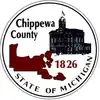 Logo | |
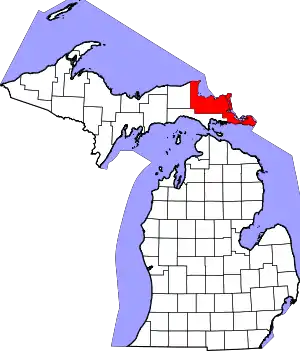 Location within the U.S. state of Michigan | |
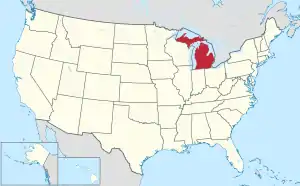 Michigan's location within the U.S. | |
| Coordinates: 46°19′N 84°31′W / 46.32°N 84.52°W | |
| Country | |
| State | |
| Founded | December 22, 1826[1][2] |
| Named for | Ojibwe people |
| Seat | Sault Ste. Marie |
| Largest city | Sault Ste. Marie |
| Area | |
| • Total | 2,698 sq mi (6,990 km2) |
| • Land | 1,558 sq mi (4,040 km2) |
| • Water | 1,140 sq mi (3,000 km2) 42% |
| Population (2020) | |
| • Total | 36,785 |
| • Density | 25/sq mi (10/km2) |
| Time zone | UTC−5 (Eastern) |
| • Summer (DST) | UTC−4 (EDT) |
| Congressional district | 1st |
| Website | www |
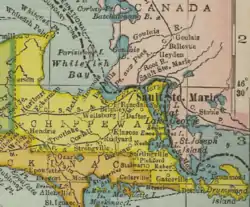
Chippewa County (/ˈtʃɪpəwɒ/ CHIH-pə-wah) is a county in the eastern Upper Peninsula of the U.S. state of Michigan. As of the 2020 census, the population was 36,785.[3] The county seat is Sault Ste. Marie.[4] The county is named for the Ojibwe (Chippewa) people, and was set off and organized in 1826.[1] Chippewa County comprises the Sault Ste. Marie, MI micropolitan statistical area.
With shorelines on Lake Huron and Lake Superior, Chippewa County is one of two U.S. counties to contain shorelines on two Great Lakes, the other being neighboring Mackinac County. The county's irregular shape follows the Canadian border, itself following the St. Marys River. Drummond Island is part of Chippewa County.
Geography
According to the U.S. Census Bureau, the county has a total area of 2,698 square miles (6,990 km2), of which 1,558 square miles (4,040 km2) is land and 1,140 square miles (3,000 km2) (42%) is water.[5] It is the second-largest county in Michigan by land area and fifth-largest by total area.
The Michigan Meridian runs through the eastern portion of the county. South of Nine Mile Road, M-129 (Meridian Road) overlays the meridian. In Sault Ste. Marie, Meridian Street north of 12th Avenue overlays the meridian.
Adjacent counties & districts
By land
- Mackinac County (south)
- Luce County (west)
By water
- Presque Isle County (south)
- Algoma District, Ontario, Canada (north)
- Manitoulin District, Ontario, Canada (east)
National protected areas
Game areas
The Munuscong Bay is open for hunting, boating and bird watching. The area is known for its duck hunting, including mallards, divers and green-winged teal ducks. The Bay is most known for its icefishing and duck hunting. During opening weekend of duck season (late September), hundreds of hunters come from all over the state to begin their season on the Bay. This area has many types of waterfowl pass through it on their annual migrations.
Communities

City
- Sault Ste. Marie (county seat)
Village
Charter township
Civil townships
Census-designated places
Unincorporated communities
- Barbeau
- Bay Mills
- Bay Mills Indian Community (Indian Reservation)
- Dafter (named Stevensburg until 1893)
- Drummond
- Eckerman
- Emerson
- Goetzville (named Gatesville until 1917)
- Homestead
- Johnswood
- Hulbert
- Kelden (also spelled Keldon)
- Kinross
- Mission
- Neebish Island
- Paradise
- Pickford
- Raber
- Raco
- Rudyard (named Pine River until 1890)
- Shelldrake (Ghost town)
- Stalwart
- Stirlingville (named Jolly's Landing until 1888)
- Strongs
- Trout Lake
- Whitefish Point
- Vermilion
Indian reservations
- The Bay Mills Indian Community occupies a portion of land within Bay Mills Township and Superior Township, within another smaller portion within Sugar Island Township.
- The Sault Tribe of Chippewa Indians occupies scattered pieces of land within Kinross Charter Township, Sugar Island Township, and in the city limits of Sault Ste. Marie.
Demographics
| Census | Pop. | Note | %± |
|---|---|---|---|
| 1830 | 626 | — | |
| 1840 | 534 | −14.7% | |
| 1850 | 898 | 68.2% | |
| 1860 | 1,603 | 78.5% | |
| 1870 | 1,689 | 5.4% | |
| 1880 | 5,248 | 210.7% | |
| 1890 | 12,019 | 129.0% | |
| 1900 | 21,338 | 77.5% | |
| 1910 | 24,472 | 14.7% | |
| 1920 | 24,818 | 1.4% | |
| 1930 | 25,047 | 0.9% | |
| 1940 | 27,807 | 11.0% | |
| 1950 | 29,206 | 5.0% | |
| 1960 | 32,655 | 11.8% | |
| 1970 | 32,412 | −0.7% | |
| 1980 | 29,029 | −10.4% | |
| 1990 | 34,604 | 19.2% | |
| 2000 | 38,543 | 11.4% | |
| 2010 | 38,520 | −0.1% | |
| 2020 | 36,785 | −4.5% | |
| US Decennial Census[6] 1790–1960[7] 1900–1990[8] 1990–2000[9] 2010–2018[3] | |||
In 2020, the county had a population of 36,785.
The 2010 American Community Survey 3-year estimate indicated the median income for a household in the county was $39,351 and the median income for a family was $54,625.[10] Males had a median income of $25,760 versus $16,782 for females. The per capita income for the county was $19,334. About 2.3% of families and 18.6% of the population were below the poverty line, including 26.0% of those under the age 18 and 10.0% of those age 65 or over.
Government
Chippewa County voters have been reliably Republican from the start. Since 1876, they have selected the Republican Party nominee in 86% of national elections (31 of 36).
| Year | Republican | Democratic | Third party | |||
|---|---|---|---|---|---|---|
| No. | % | No. | % | No. | % | |
| 2020 | 10,681 | 60.44% | 6,648 | 37.62% | 342 | 1.94% |
| 2016 | 9,122 | 58.65% | 5,379 | 34.59% | 1,051 | 6.76% |
| 2012 | 8,278 | 52.86% | 7,100 | 45.34% | 282 | 1.80% |
| 2008 | 8,267 | 49.48% | 8,184 | 48.98% | 257 | 1.54% |
| 2004 | 9,122 | 55.33% | 7,203 | 43.69% | 163 | 0.99% |
| 2000 | 7,526 | 52.43% | 6,370 | 44.38% | 458 | 3.19% |
| 1996 | 5,137 | 38.74% | 6,532 | 49.26% | 1,590 | 11.99% |
| 1992 | 5,462 | 40.02% | 5,434 | 39.82% | 2,751 | 20.16% |
| 1988 | 6,786 | 56.23% | 5,222 | 43.27% | 60 | 0.50% |
| 1984 | 8,135 | 63.77% | 4,575 | 35.86% | 47 | 0.37% |
| 1980 | 7,059 | 52.31% | 5,268 | 39.04% | 1,167 | 8.65% |
| 1976 | 7,025 | 53.32% | 6,022 | 45.71% | 128 | 0.97% |
| 1972 | 7,028 | 59.03% | 4,744 | 39.85% | 134 | 1.13% |
| 1968 | 5,359 | 52.04% | 4,132 | 40.13% | 806 | 7.83% |
| 1964 | 4,098 | 38.45% | 6,537 | 61.33% | 23 | 0.22% |
| 1960 | 6,490 | 55.23% | 5,239 | 44.58% | 22 | 0.19% |
| 1956 | 6,957 | 62.81% | 4,106 | 37.07% | 14 | 0.13% |
| 1952 | 7,075 | 62.12% | 4,257 | 37.38% | 57 | 0.50% |
| 1948 | 4,977 | 53.34% | 3,860 | 41.37% | 494 | 5.29% |
| 1944 | 5,335 | 54.86% | 4,344 | 44.67% | 46 | 0.47% |
| 1940 | 5,851 | 51.54% | 5,473 | 48.21% | 29 | 0.26% |
| 1936 | 4,901 | 47.13% | 5,259 | 50.58% | 238 | 2.29% |
| 1932 | 5,252 | 54.34% | 4,221 | 43.67% | 192 | 1.99% |
| 1928 | 5,326 | 68.68% | 2,355 | 30.37% | 74 | 0.95% |
| 1924 | 5,443 | 77.44% | 516 | 7.34% | 1,070 | 15.22% |
| 1920 | 4,732 | 74.36% | 1,266 | 19.89% | 366 | 5.75% |
| 1916 | 2,365 | 54.64% | 1,768 | 40.85% | 195 | 4.51% |
| 1912 | 889 | 23.31% | 879 | 23.05% | 2,046 | 53.64% |
| 1908 | 2,418 | 64.19% | 1,175 | 31.19% | 174 | 4.62% |
| 1904 | 2,920 | 77.78% | 662 | 17.63% | 172 | 4.58% |
| 1900 | 2,477 | 71.59% | 893 | 25.81% | 90 | 2.60% |
| 1896 | 2,105 | 65.52% | 1,001 | 31.15% | 107 | 3.33% |
| 1892 | 1,247 | 52.33% | 1,083 | 45.45% | 53 | 2.22% |
| 1888 | 1,055 | 51.56% | 909 | 44.43% | 82 | 4.01% |
| 1884 | 686 | 51.12% | 635 | 47.32% | 21 | 1.56% |
| 1880 | 396 | 53.15% | 347 | 46.58% | 2 | 0.27% |
| 1876 | 172 | 37.80% | 283 | 62.20% | 0 | 0.00% |
The county government operates the jail, maintains rural roads, operates the major local courts, records deeds, mortgages, and vital records, administers public health regulations, and participates with the state in the provision of social services. The county board of commissioners controls the budget and has limited authority to make laws or ordinances. In Michigan, most local government functions — police and fire, building and zoning, tax assessment, street maintenance, etc. — are the responsibility of individual cities and townships.
Elected officials
- Prosecuting Attorney: Robert L. Stratton
- Sheriff: Michael Bitnar
- County Clerk: Cathy Maleport
- County Treasurer: Carmen Fazzari
- Register of Deeds: Sharon H. Kennedy
- Drain Commissioner: James Zimmerman
- County Surveyor: Robert Laitinen [12]
(Current as of October 2018)[13]
Transportation
Major highways
All Interstate and US Highways in Michigan are all state-maintained highways and part of the Michigan State Trunkline Highway System.
 I-75 is Michigan's longest state highway overall; it ends on the Sault Ste. Marie International Bridge at the Canada border.
I-75 is Michigan's longest state highway overall; it ends on the Sault Ste. Marie International Bridge at the Canada border. BS I-75 travels from I-75 into downtown Sault Ste. Marie, and ends at the ferry to Sugar Island.
BS I-75 travels from I-75 into downtown Sault Ste. Marie, and ends at the ferry to Sugar Island.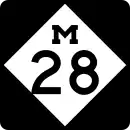 M-28 is Michigan's longest state highway; it ends at M-129 eight miles (13 km) south of Sault Ste. Marie.
M-28 is Michigan's longest state highway; it ends at M-129 eight miles (13 km) south of Sault Ste. Marie. M-48 is a highway that goes through Pickford and Rudyard, and ends at exit 373 on I-75.
M-48 is a highway that goes through Pickford and Rudyard, and ends at exit 373 on I-75. M-80 is a highway that begins at exit 378 on I-75, goes through the former base in Kincheloe, and terminates at M-129.
M-80 is a highway that begins at exit 378 on I-75, goes through the former base in Kincheloe, and terminates at M-129. M-123 is a highway that is the main connector from Tahquamenon Falls to M-28.
M-123 is a highway that is the main connector from Tahquamenon Falls to M-28. M-129 (also known as Meridian Road) runs through the eastern part of the county, and ends at BS I-75 just south of Sault Ste. Marie.
M-129 (also known as Meridian Road) runs through the eastern part of the county, and ends at BS I-75 just south of Sault Ste. Marie. M-134 is a highway that goes to and terminates on Drummond Island.
M-134 is a highway that goes to and terminates on Drummond Island. M-221 is the shortest highway in Chippewa County, just going through Brimley and ending at M-28.
M-221 is the shortest highway in Chippewa County, just going through Brimley and ending at M-28.
County-designated highways
The following highways are maintained by the Chippewa County Road Commission as part of the county road system. They are assigned numbers by the Michigan Department of Transportation as part of the County-Designated Highway System.
 H-40
H-40 H-63 runs via Mackinac Trail, the former route of US 2 before it was replaced by I-75 in 1962.
H-63 runs via Mackinac Trail, the former route of US 2 before it was replaced by I-75 in 1962. FFH 42(Whitefish Bay National Forest Scenic Byway), is a National Forest Scenic Byway with the US Forest Service the Chippewa County Road Commission jointly maintains.
FFH 42(Whitefish Bay National Forest Scenic Byway), is a National Forest Scenic Byway with the US Forest Service the Chippewa County Road Commission jointly maintains.
Airports
- Chippewa County International Airport (CIU) serves Chippewa county and the surrounding communities, providing commercial connection to hub airports.
- Drummond Island Airport (DRM) is a public-owned, public-use general-aviation airport with 2 runways (1 hard-surfaced).
The Michigan Aerospace Manufacturers Association announced that Chippewa County will house its new command and control center. In last year, this is the third major announcement from the organization — guiding Michigan's aerospace and defense manufacturing community within the global industry. Previously, MAMA announced plans for a Oscoda, Michigan Wurtsmith Airport horizontal launch site at and a Marquette, Michigan vertical launch site.[14][15]
See also
References
- 1 2 "Bibliography on Chippewa County". Clarke Historical Library, Central Michigan University. Retrieved July 17, 2013.
- ↑ Chapman, C.H. (February 23, 1893). "Early History of Chippewa County: Lore of Old" (PDF). Lansing MI: The News/Chippewa County Government. Archived from the original (PDF) on July 16, 2012. Retrieved February 25, 2013.
- 1 2 "State & County QuickFacts". US Census Bureau. Retrieved September 15, 2021.
- ↑ "Find a County". National Association of Counties. Retrieved June 7, 2011.
- ↑ "2010 Census Gazetteer Files". US Census Bureau. August 22, 2012. Archived from the original on November 13, 2013. Retrieved September 19, 2014.
- ↑ "US Decennial Census". US Census Bureau. Retrieved September 19, 2014.
- ↑ "Historical Census Browser". University of Virginia Library. Archived from the original on May 30, 2019. Retrieved September 19, 2014.
- ↑ "Population of Counties by Decennial Census: 1900 to 1990". US Census Bureau. Retrieved September 19, 2014.
- ↑ "Census 2000 PHC-T-4. Ranking Tables for Counties: 1990 and 2000" (PDF). US Census Bureau. Retrieved September 19, 2014.
- ↑ "U.S. Census website". US Census Bureau. Retrieved March 11, 2012.
- ↑ US Election Atlas
- ↑ "Press Release: NCEES honors Michigan surveyor William Karr for service" (PDF). National Council of Examiners for Engineering and Surveying. Archived from the original (PDF) on January 4, 2015. Retrieved February 25, 2013.
- ↑ Chippewa County website
- ↑ "News: U.P. airport selected as command center for Michigan's rocket launch sites". MLive. January 28, 2021.
- ↑ Lawrence, Eric D. (January 29, 2021). "Upper Peninsula's Chippewa County to host Michigan rocket launch command center". Detroit Free Press. p. 12.(subscription required)